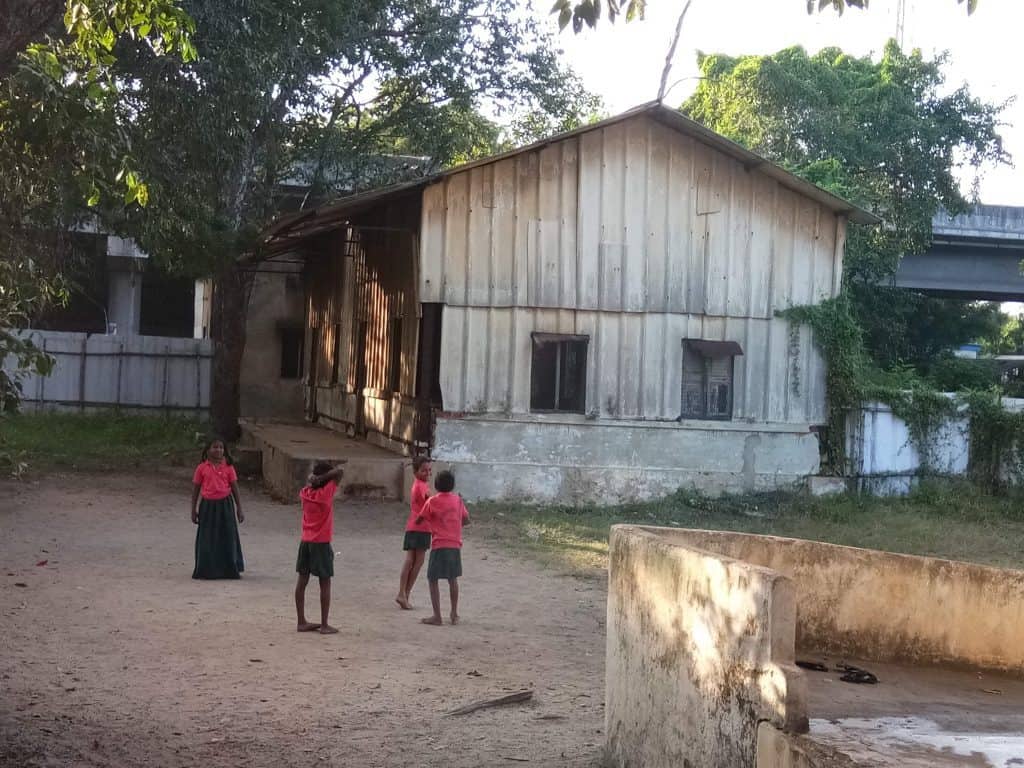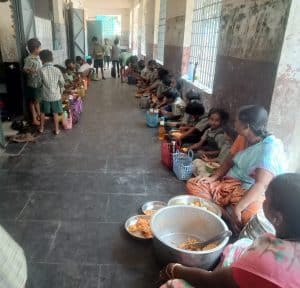As lunch hour breaks, there’s palpable energy among the students of Chennai Primary School run by the Greater Chennai Corporation (GCC) in Tondiarpet, as they gather to eat their protein-rich midday meal — eggs and sambar rice. However, just a few kilometres away, the students in the Government Primary School at Ennore, are not as fortunate. Forget mid-day meals, the 32 children belonging to various classes of the government school do not even have enough room to sit according to class – they are all accommodated in a single congested asbestos-sheeted classroom.

Government Primary School, Ennore, has a total strength of 32 students of different classes and the classes are held in the single classroom built with asbestos sheets.
The school in Tondiarpet has roped in NGOs for conducting extracurricular activities apart from teachers and volunteers who teach the regular curriculum. Thus you could well find the children letting their imagination and creativity flow under the guidance of their drawing teacher, Easwari, a volunteer from NalandaWay Foundation. At the Ennore school, there is one teacher for all the 32 students cramped in that room. Students in the fifth class listen to the tables being taught to the Class I students.
But, why such disparity between a government school and a corporation school in Chennai? Both these institutions, despite coming directly under the purview of Tamil Nadu government, are often found to lack adequate facilities. But a reality check at a few schools in the city shows that government schools, in particular, are even more neglected and most often fare worse than their counterparts.
This becomes clear once more when one visits the Greater Chennai Primary School, Thiruvanmiyur, where the children enthusiastically welcome the HEAL (Holistic Education and Adaptive Learning) Foundation team. The NGO educates the students on general health, hygiene and spoken English, while imparting socio-emotional learning. Children are seated on neat benches and the artwork displayed on the walls not only lends brightness to the classroom ambiance, but also indicates that the school is taking efforts to introduce extracurricular activities to the students.
In contrast to the stereotypical image of a Corporation school, this school has decent facilities and infrastructure — including a playground, toilets, drinking water and mid-day meals among many others. There are enough teachers and staff to attend to the students.
In sharp contrast, at the Adi Dravidar Government High School, Anakaputhur, you’ll find that even the toilets are locked. An attender informs that she is ordered to keep them locked. “We cannot trust the students; they may indulge in anti-social activities. I unlock them when they want to use them,” she said. But when she opened the restroom, the pit latrine was dusty, indicating that it had not been used in recent times. The school has constructed a new building with six Indian toilets, which are also locked. “We are waiting to inaugurate the block,” the staff added. Although the state government promises to build toilets every year, it is still a far cry in many government schools.
A student evaded the question when we asked him about the locked restrooms and what if he needed to use one. A parent of a girl student said that her daughter would not drink water in school, just to avoid going to the restroom.
| Corporation schools | Government schools |
|
|
|
|
(The table has been created based on the direct observations and inputs given by facilitators from NGOs and activists.)

Students of Chennai Primary School, Tondiarpet, relish the nutritious mid-day meals provided on the campus. Pic: Bhavani Prabhakar
The glaring disparity as seen in the above schools are not isolated cases but appears to be generally true of schools in Chennai. “Infrastructure is inadequate in government schools throughout Tamil Nadu. Lack of enough classrooms and teachers are the two most critical things that we observe. The toilets are either absent or not maintained properly in these institutions,” said Aruna Subramaniam, one of the trustees of Bhoomika Trust, a Chennai-based disaster management NGO.
Explaining the differences
A first question that may arise here is why have different institutions at the local body and state-level, and are too many schools causing the problem here by stressing limited resources?
Experts disagree. According to another expert who did not wish to be named, the affiliation to the corporation or state government is not an issue – they complement each other. “The population has increased over the years and there is a demand for more schools, hence this is merely replication of a much-needed service by another government body,” the expert said.
“The logic of having two different types of institutions with diverse ownership also makes it convenient to administer schools from an infrastructure/financial perspective,” said Vijayalakshmi Mohan, Executive, Government Relations at Madhi Foundation (NGO working in the education sector).
Talking about the involvement and enthusiasm shown by teachers in catalysing change, social activist Jagadeeswaran D said, “The teachers are rarely exceptional in government institutions and in my experience of working with such schools, not all teachers follow up even if a student drops out. The corporation schools are slightly above the bar and the staff go the extra mile to develop the institution.”
Differences also arise due to the complex administrative structure in government schools: the in-charge of a government school has to go through a complex hierarchy to seek permission to collaborate with NGOs or bring about any change. Citing the instance of construction of a new block, Jagadeeswaran said, “The request from a Head Master (of a government school) reaches the Principal Secretary of School Education, after passing through various levels of officers. The plea is then passed on to the Principal Secretary of the Public Works Department and goes through a similar process. The headmaster of a government school does not have a direct say on any kind of upgrades.”
Such hierarchy and procedural delays discourage government school staff from undertaking proactive initiatives. Retired Army Captain and HEAL Foundation co-founder Lekshmy Natarajan had to withdraw the sessions conducted in Tirusulam Government School. “The staff members were non-cooperative; they were always buried in paperwork and did not show any interest,” she said.
However, officials from the Tamil Nadu School Education Department are in complete denial. “All government schools have sufficient facilities, including toilets. We partner with NGOs for conducting sessions and also receive in-kind donations like seating facilities. Plans for further improvement will be worked out in the coming academic year,” said the Chief Educational Officer of Chennai.
Instead of denying the allegations against the 2 Gov’t schools, the CEO Chennai should try to make the infrastructures in the schools sufficient as expected.